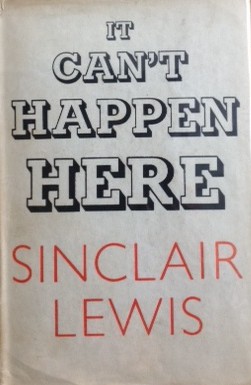Inspiring Older Readers
 posted on 14 Apr 2017
posted on 14 Apr 2017
It Can’t Happen Here by Sinclair Lewis
Published in 1935 this novel sat around in relative obscurity until late last year when it suddenly became one of the most ordered books on the internet. What prompted this sudden renaissance? Well, it’s not hard to pin down – the rise and rise of Donald J. Trump.
Lewis’s novel describes the rise of a tub-thumping populist politician, Berzelius (Buzz) Windrip, who, from nowhere, emerges as the Democratic nominee and then against all expectations, wins the Presidency. Doremus Jessop, the long term editor of The Informer, the town newspaper, and classically complacent liberal is forced to watch and endure the quite rapid slide of Windrip’s administration from populist rabble-rousing to sinister Fascism.
There is no doubt that there are quite spooky parallels between the world of Lewis’s novel and the real modern world - but it would be a major mistake to equate the book too closely to real life. It Can’t Happen Here should not be judged as a prophesy because that’s not what it was ever meant to be – it was written against the backdrop of emerging populist Fascism in Europe and what Lewis is trying to do here is to trace the way these ideologies develop and how the negligence of liberal or tolerant ‘ordinary’ people allows monsters to emerge. What he’s also keen to do is to illustrate just how seemingly civilised, decent people can transform into brutal oppressors when they are given permission to behave in that way.
Lewis is writing a satire on Thirties political discourse and the way that marginalisation, poverty and disaffection amongst the mass of the population can be manipulated by unscrupulous power-hungry demagogues. Simple promises, lies that cannot be made good on, the bogus promises of the fruits of patriotism are all central to the emergence of totalitarianism.
The first 100 pages or so of this novel will, I guarantee, send a shiver of recognition down your back – it describes the rise of populism and its attractions to the angry, often politically inarticulate mass of voters brilliantly. But this is not an issue that is exclusive to Trump’s rise in the USA. What Lewis has to tell us might well apply equally to the rise of the populist Right in Poland, Hungary, Holland, Italy and France. It should also have echoes for us here in the UK as we try and understand the way in which a populist Right is being allowed to set the political agenda – Brexit and all.
It Can’t Happen Here isn’t, nor is it meant to be, a realistic novel. The slide into Fascism, the grotesques who seize power, the complacency and inaction of the liberal progressives, the speed with which the rule of law is abandoned and, ultimately, the way the populist movement – the Corpos – begins to spiral into fratricide are all exaggerated for impact and effect. The ‘everyman’ role of Jessup is quite hard to identify with over the length of the novel and the seeming absence of any kind of oppositionalism is quite hard to swallow – of course Lewis had no concept of the internet or social media and this alone has changed the ground-rules for this kind of coup in the 21st century.
Lewis isn’t in my view a particularly good novelist – there’s a lot of clumsy stuff here – but he is an excellent novelist of ideas. Replace the anti-Semitism of the Corpos with the current Islamaphobic propaganda and you’ll immediately see its relevance. This is a book that deserved to be saved from obscurity because it deals with issues that need to be discussed and it delivers the vital message that we need to always remember – we’ve been here before and we need to learn the lessons of history.
Terry Potter
April 2017